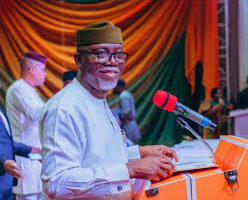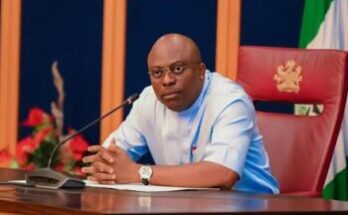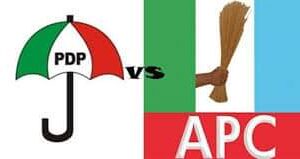The All Progressives Congress (APC) finally got its acts together and ensured the emergence of the leadership of the national Assembly of its choice unlike the blunder it committed four years ago.Patrick Andrew writes.
Slumbering in arrogance
Emerging from a rare feat of defeating a seemingly invincible sitting government, the All Progressives Congress (APC) tended to have swathed in the euphoria of the thinly expected success. It basked in the victory, spent too much time in celebration and ultimately forgot to gear up for other pending contests which could solidify its grip on the reins of power.
The leadership of the party perhaps unwary of the dynamics and theatrics of political foolery and may be trusting that all party members especially those in the National Assembly shared same level of loyalty took it for granted that its instruction as regards the leadership structure of the 8th NASS will be respected. It was not to be. Smarter politicians eager and ready to catch on the situation in disdain to the designs and graph plotted by the party went to work.
The APC national chairman and national leader, Chief John Odigie-Oyegun and Asiwaju Bola Ahmed Tinubu had directed that all work for the emergence of Senator Ahmed Lawan (Yobe North) and George Akume as the senate president and deputy senate president respectively. In the same vein, it announced that Femi Gbajabiamila and Ali Monguno were to assume the positions of Speaker and Deputy Speaker of the House of Representatives.
Consumed by the thoughts of party supremacy, the party leadership simply directed the lawmakers-elect to accept its endorsed candidates whether they were consulted before they were public announced or not. Of course, the alacrity with which the directive was given in the estimation of some angered the lawmakers particularly those that had harboured the ambition to vie for these positions.
At some point, it was alleged that some leading lights at the apex of the party’s leadership attempted to stampede the lawmakers especially those from the lower chamber to swallow its order without blinking. It was stated that in an effort to foist the anointed candidates on the lawmakers a mock election was conducted where the anointed emerged winners.
But this apparent manipulation tended to anger the opposers all the more. They subsequently formed the aggrieved group and openly defied the party in a manner that culminated in the election of certain leaders against the wishes of the party. The group produced Senator Bukola Saraki of the APC as senate president, Ike Ekweremadu of the opposition PDP as the deputy senate president. In the opposite direction, Yakubu Dogara against the persuasion and insistence of the party defeated Femi Gbajabiamila alas by eight votes to emerge speaker even as Monguno could not edged Suilaman Lasun for the deputy speaker’s job. The die was, therefore, cast and the battle line drawn.
Slur on APC
Last March, following the conclusion of the general elections, APC national chairman Comrade Adams Oshiomhole gave the indication of what to expect from the 9th National Assembly, insisting that the party will not allow the mistakes of 2015 to reoccur when the new national assembly is inaugurated in June.
Addressing newly elected members of the House of Representatives at the Shehu Yar’adua Centre in Abuja, Oshiomhole said the APC was not prepared to share offices of principal officers of the house and headship of critical committees with the opposition, Peoples Democratic Party, except for position reserved for minority members.
“And that you have the numbers and we will use those numbers to ensure that we have a leadership that command the trust and the respect of all the members of the House of Representatives. There will be contestation, that is why we are in democracy but after the contestation and debate we have to agree, and once you have agree you move forward.
“We have the numbers to produce the speaker and we will produce the speaker, who must be a member of the APC. We have the numbers to produce the deputy speaker and we will use the numbers to produce the deputy speaker, who must be a member of the APC. We have the number and we must use the numbers to elect a house leader who must be a member of APC.
“We have the numbers and we will use the numbers to produce a chief whip and a deputy whip who must be members of the APC. I think the only position that we are not interested in is the minority leader. Let it remain minor in the hands of the minors in the opposition.
“We will not share power in the House of the Representatives and the leadership must ensure that critical committees that drive government are chaired only by APC members. If the Nigeria people wanted to be chairmen of committees they would have voted for them”, he said.
He was later to pin down the failure of the party to exercise absolute control on situations that led to the emergence of the untoward 8th NASS leadership on the lack of vision, character and tenacity of the immediate past chairman, Chief Odigie-Oyegun.
Anointment with a difference
Oshiomhole not known to shy away from fights openly took on the PDP and others who felt that endorsement of certain candidates amounts to imposition and insisted that democracy does not mean accommodating losers but that the winning must form a government at its discretion without any recourse to the defeated party.
He proceeded to named Ahmed Lawan and Femi Gbajiabiamila as the party’s anointed candidates for the position of president of the senate and speaker of the House of Representatives respectively and was unwilling to budge despite the motley of complaints and outright condemnation of the stance of the party.
Unlike 2015 when high handedness tended to be the order of the day, the APC leadership in 2019 at a wider forum opted to relegate Oshiomhole – keep out of public attention, instead encouraged the anointed candidates to embark on consultations across party lines, negotiated with the oppositions, individual lawmakers and even key stakeholders in the Nigerian political firmament.
The senator-elect representing the Osun West senatorial district succinctly captured the new dynamic approach adopted by the APC this time around. According to him, the decision of the APC national leadership and its governors to insist on the candidacy of Senators Ahmed Lawan, Ovie Omo-Agege as the senate president, and deputy senate president, and Femi Gbajabiamila and Ahmed Muhammed Wase as speaker and deputy speaker respectively must be respected by all lawmakers elected on the platform of the party.
Rather than being an imposition and therefore anti-democratic, he said it simply portrays the supremacy of the party.
“No, the insistence of the party that certain candidates be elected as leaders of the 9th National Assembly should be seen as a guide to APC lawmakers to forestall the kind of conflict that occurred following the 2015 exercise when some selfish elements opted to go against the policy of the party.
“In democracy, a party must give direction, guides and ensures that lawmakers elected on its platform facilitate the implementation of its policies and programmes.
“The APC lawmakers complying by the decision and direction given by the party will produce a very good and pleasant assembly that will work harmoniously with the executive to move the country forward.
“The trust is not about legislature, executive fighting each other, it does not translate to check and balances. In fact, the check and balances is to mutually look at what each arm from the perspective of its respective functions and where it becomes necessary for them to sit down and discuss to do so amicably”, he said.
Conclusion
Compromise, negotiation and dialogue were the major campaign strategies and the trust that propelled the anointed candidates to build confidence in their candidacy before those who at first had opposed their endorsement and even won over members of the opposition lawmakers. Even President Muhammadu Buhari who had been less concerned in the past took active interest and met severally with aspirants and convinced them to step down for the party’s candidates of choice.
In the end, even the PDP knew these candidates would have little or no obstacle emerging in the respective positions the APC had meant for them.



